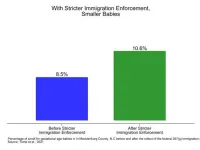New report explores effect of coffee through our daily sleep and wake cycles
The Institute for Scientific Information on Coffee (ISIC) published a new report today, titled 'Coffee and sleep in everyday lives', authored by Professor Renata Riha, from the Department of Sleep Medicine at the University of Edinburgh.
2021-02-04
(Press-News.org) The Institute for Scientific Information on Coffee (ISIC) published a new report today, titled 'Coffee and sleep in everyday lives', authored by Professor Renata Riha, from the Department of Sleep Medicine at the University of Edinburgh. It reviews the latest research into coffee's effect on sleep and suggests that while drinking coffee early in the day can help support alertness and concentration levels1, especially when sleep patterns are disturbed; decreasing intake six hours before bedtime may help reduce its impact on sleep2.
Coffee is largely consumed daily for the pleasure of its taste3, as well as its beneficial effect on wakefulness and concentration (due to its caffeine content)4. This may be particularly the case for those experiencing restricted sleep, and those adjusting to new sleep/wake cycles, such as shiftworkers5.
For those affected by restricted sleep, regular coffee can help to effectively mitigate short-term cognitive impairment brought about by sleep loss4. This was reported in a study which found that consuming 300mg of caffeine (or three cups of coffee) per day can help to improve people's vigilance, alertness, reaction-time, accuracy and working memory in the first three days of poor sleep, compared to decaffeinated coffee4. For those working nightshifts, consuming caffeine has been found to improve psychomotor performance and vigilance, based on a study of emergency medical teams6. However, the researchers of this study note that it may affect later sleep quality and duration6.
Furthermore, the report highlights another interesting relationship between the impact of coffee consumption timing on sleep time and quality, especially when consumed close to sleep time7. The report findings suggest that caffeine's effect on sleep depends on the amount consumed throughout the day, individual susceptibilities and consumption habits7,8,9. For those sensitive to caffeine, limiting consumption six hours prior to sleep time can help lessen its effects2.
The author, Professor Renata Riha commented: "Caffeine is consumed daily by roughly 80% of the world's population, often for its benefits in promoting wakefulness and concentration. Its effects can last for several hours, depending on how quickly or slowly it is metabolised by the body. Those who find that drinking coffee later in the day disrupts their sleep patterns may wish to swap to low caffeine drinks, or decaffeinated coffee during the afternoon and evening."
INFORMATION:
To read the report entitled, 'Coffee and sleep in everyday lives', click here.
Additional background information on coffee can be found at http://www.coffeeandhealth.org, a science-based resource developed for healthcare and other professional audiences, providing the latest information and research into coffee, caffeine and health.
Notes to editors
Moderate coffee consumption can be defined as 3-5 cups per day, based on the European Food Safety Authority's review of caffeine safety10.
Pregnant and breastfeeding women are advised to limit their caffeine intake to 200 mg per day10.
Author of the report
Dr. Renata Riha, Centre for Clinical Brain Sciences, Sleep Research Unit, Department of Sleep Medicine, Royal Infirmary of Edinburgh, The University of Edinburgh.
References
1EFSA Panel on Dietetic Products, Nutrition and Allergies (NDA) (2011) Scientific Opinion on the substantiation of health claims related to caffeine and increased fat oxidation leading to a reduction in body fat mass (ID 735, 1484), increased energy expenditure leading to a reduction in body weight (ID 1487), increased alertness (ID 736, 1101, 1187, 1485, 1491, 2063, 2103) and increased attention (ID 736, 1485, 1491, 2375) pursuant to Article 13(1) of Regulation (EC) No 1924/20061. EFSA Journal, 9(4):2054.
2Drake C. et al. (2013) Caffeine Effects on Sleep Taken 0, 3, or 6 Hours before Going to Bed. J Clin Sleep Med, 9(11): 1195-1200.
3Nieber K. (2017) The Impact of Coffee on Health. Planta Med, 83: 1256-1263.
4Baur DM et al. (2021) Coffee effectively attenuates impaired attention in ADORA2A C/C-allele carriers during chronic sleep restriction. Progress in Neuro-Psychopharmacology and Biological Psychiatry. Published online ahead of print.
5Kolla B.P., Auger R.R. (2011) Jet lag and shift work sleep disorders: how to help reset the internal clock. Cleve Clin J Med, 78(10):675-84.
6Temple J.L. (2018) Systematic Review and Meta-analysis of the Effects of Caffeine in Fatigued Shift Workers: Implications for Emergency Medical Services Personnel. Prehosp Emerg Care, 22(Supp1):37-46.
7Clark I. and Landolt H.P. (2016) Coffee, Caffeine, and Sleep. Sleep Med Rev, 31:70-78.
8Roehrs T. et al. (2008) Caffeine: sleep and daytime sleepiness. Sleep Med Rev, 12:153-62.
9Elmenhorst D. et al. (2007) Sleep deprivation increases A1 Adenosine receptor binding in the human brain: A positron emission tomography study. J Neurosci, 27(9):2410-2415.
10EFSA (2015) Scientific Opinion on the Safety of Caffeine, EFSA Journal, 13(5):4102.
About ISIC
The Institute for Scientific Information on Coffee (ISIC) is a not-for-profit organization, established in 1990 and devoted to the study and disclosure of science related to "coffee and health." Since 2003 ISIC also supports a pan-European education programme, working in partnership with national coffee associations in nine countries to convey current scientific knowledge on "coffee and health" to healthcare professionals.
ISIC's activities are focused on:
the study of scientific matters related to "coffee and health"
the collection and evaluation of studies and scientific information about "coffee and health"
the support of independent scientific research on "coffee and health"
active dissemination of balanced "coffee and health" scientific research and knowledge to a broad range of stakeholders.
ISIC respects scientific research ethics in all its activities. ISIC's communications are based on sound science and rely on scientific studies derived from peer-reviewed scientific journals and other publications.
ISIC members are six of the major European coffee companies: illycaffè, Jacobs Douwe Egberts, Lavazza, Nestlé, Paulig, and Tchibo.
About coffeeandhealth.org
The website http://www.coffeeandhealth.org is a science-based resource developed for healthcare and other professional audiences and provides the latest information and research into coffee, caffeine and health.
Follow us on twitter: @coffeeandhealth
ELSE PRESS RELEASES FROM THIS DATE:
2021-02-04
A new study further highlighting a potential physiological cause of clinical depression could guide future treatment options for this serious mental health disorder. Published in Frontiers in Psychiatry, researchers show differences between the cellular composition of the brain in depressed adults who died by suicide and non-psychiatric individuals who died suddenly by other means.
"We found a reduced number of astrocytes, highlighted by staining the protein vimentin, in many regions of the brain in depressed adults," reports Naguib Mechawar, a Professor at the Department of Psychiatry, McGill University, Canada, and senior author of this article. ...
2021-02-04
Researchers from University of Notre Dame, York University (Canada), and University of New England (Australia) published a new paper in the Journal of Marketing that identifies a novel reason why people under-save and demonstrates a simple, short, and inexpensive intervention that increases intentions to save and actual savings.
The study, forthcoming in the Journal of Marketing, is titled "Popping the Positive Illusion of Financial Responsibility Can Increase Personal Savings: Applications in Emerging and Western Markets" and is authored by Emily Garbinsky, Nicole Mead, and Daniel Gregg.
People around the world are not saving enough money. Since increasing ...
2021-02-04
WASHINGTON--The start of California's annual rainy season has been pushed back from November to December, prolonging the state's increasingly destructive wildfire season by nearly a month, according to new research. The study cannot confirm the shift is connected to climate change, but the results are consistent with climate models that predict drier autumns for California in a warming climate, according to the authors.
Wildfires can occur at any time in California, but fires typically burn from May through October, when the state is in its dry season. The start of the rainy season, historically in November, ends wildfire season as plants become too moist to burn.
California's rainy season has been starting progressively later in recent decades and climate ...
2021-02-04
Researchers from Nanyang Technological University, Singapore (NTU Singapore), Singapore University of Technology and Design (SUTD) and Khoo Teck Puat Hospital (KTPH) have developed a new way to create "food inks" from fresh and frozen vegetables, that preserves their nutrition and flavour better than existing methods.
Food inks are usually made from pureed foods in liquid or semi-solid form, then 3D-printed by extrusion from a nozzle, and assembled layer by layer.
Pureed foods are usually served to patients suffering from swallowing difficulties known as dysphagia. To present the ...
2021-02-04
Politicians around the world must be held to account for mishandling the covid-19 pandemic, argues a senior editor at The BMJ today.
Executive editor, Dr Kamran Abbasi, argues that at the very least, covid-19 might be classified as 'social murder' that requires redress.
Today 'social murder' may describe a lack of political attention to the conditions in which people are born, grow, live, work and age that exacerbate the pandemic.
When politicians and experts say that they are willing to allow tens of thousands of premature deaths, for the sake of population immunity or in the hope of propping up the economy, is that not premeditated ...
2021-02-03
Piezoelectric materials hold great promise as sensors and as energy harvesters but are normally much less effective at high temperatures, limiting their use in environments such as engines or space exploration. However, a new piezoelectric device developed by a team of researchers from Penn State and QorTek remains highly effective at elevated temperatures.
Clive Randall, director of Penn State's Materials Research Institute (MRI), developed the material and device in partnership with researchers from QorTek, a State College, Pennsylvania-based company specializing in smart material devices and high-density power electronics.
"NASA's need ...
2021-02-03
UNIVERSITY PARK, Pa. -- Muscle wasting, or the loss of muscle tissue, is a common problem for people with cancer, but the precise mechanisms have long eluded doctors and scientists. Now, a new study led by Penn State researchers gives new clues to how muscle wasting happens on a cellular level.
Using a mouse model of ovarian cancer, the researchers found that cancer progression led to fewer skeletal muscle ribosomes -- particles in the cell that make proteins. Because muscle mass is mainly determined by protein synthesis, having less ribosomes likely explains why muscles waste away in cancer.
Gustavo Nader, associate professor of kinesiology and physiology at Penn State, said the findings suggest a mechanism for muscle wasting that could be relevant ...
2021-02-03
DURHAM, N.C. -- Harsher immigration law enforcement by U.S. Immigration and Customs Enforcement leads to decreased use of prenatal care for immigrant mothers and declines in birth weight, according to new Duke University research.
In the study, published in PLOS ONE, researchers examine the effects of the federal 287(g) immigration program after it was introduced in North Carolina in 2006. Under 287(g) programs, which are still in effect, local law officers are deputized to act as Immigration and Customs Enforcement (ICE) agents, with authority to question individuals about immigration status, detain them, and if necessary, begin deportation proceedings.
According to the study findings, the 2006 policy change reduced birth weight ...
2021-02-03
BIRMINGHAM, Ala. - Hypoxia -- where a tissue is deprived of an adequate supply of oxygen -- is a feature inside solid cancer tumors that renders them highly invasive and resistant to treatment. Study of how cells adapt to this critical stressor, by altering their metabolism to survive in a low-oxygen environment, is important to better understand tumor growth and spread.
Researchers led by Rajeev Samant, Ph.D., professor of pathology at the University of Alabama at Birmingham, now report that chronic hypoxia, surprisingly, upregulates RNA polymerase I activity and alters the methylation patterns on ribosomal RNAs. These altered epigenetic marks on the ribosomal RNAs appear to create a pool of specialized ribosomes that can differentially ...
2021-02-03
As a native animal, kangaroos aren't typically considered a threat to Australian vegetation.
While seen as a pest on farmland - for example, when competing with livestock for resources - they usually aren't widely seen as a pest in conservation areas.
But a new collaborative study led by UNSW Sydney found that conservation reserves are showing signs of kangaroo overgrazing - that is, intensive grazing that negatively impacts the health and biodiversity of the land.
Surprisingly, the kangaroos' grazing impacts appeared to be more damaging to the land than rabbits, an introduced species.
"The kangaroos had severe impacts on soils and vegetation that were symptomatic of overgrazing," says Professor Michael Letnic, senior author of the paper and ...
LAST 30 PRESS RELEASES:
[Press-News.org] New report explores effect of coffee through our daily sleep and wake cycles
The Institute for Scientific Information on Coffee (ISIC) published a new report today, titled 'Coffee and sleep in everyday lives', authored by Professor Renata Riha, from the Department of Sleep Medicine at the University of Edinburgh.




